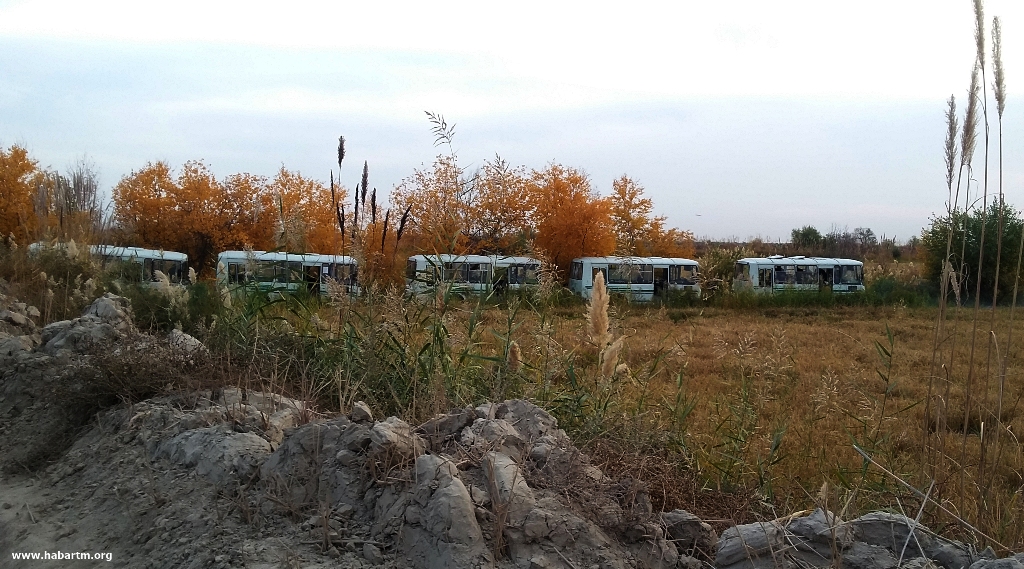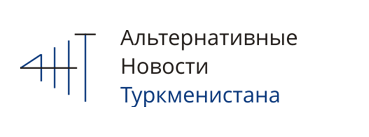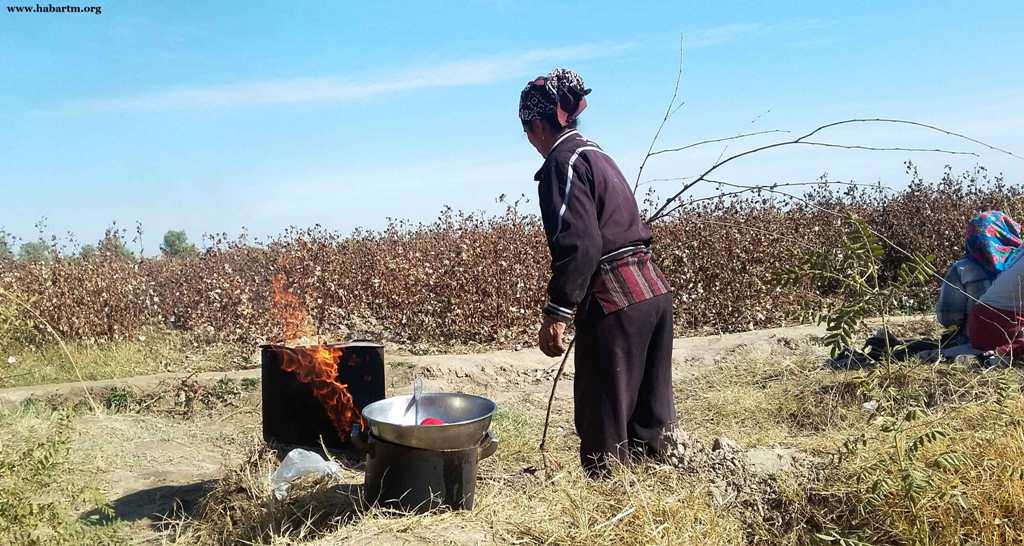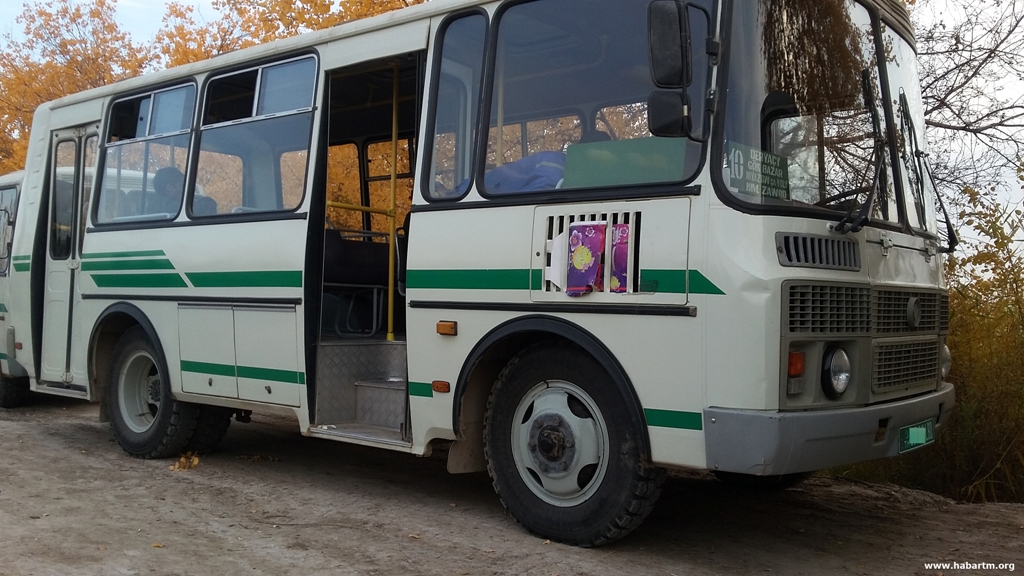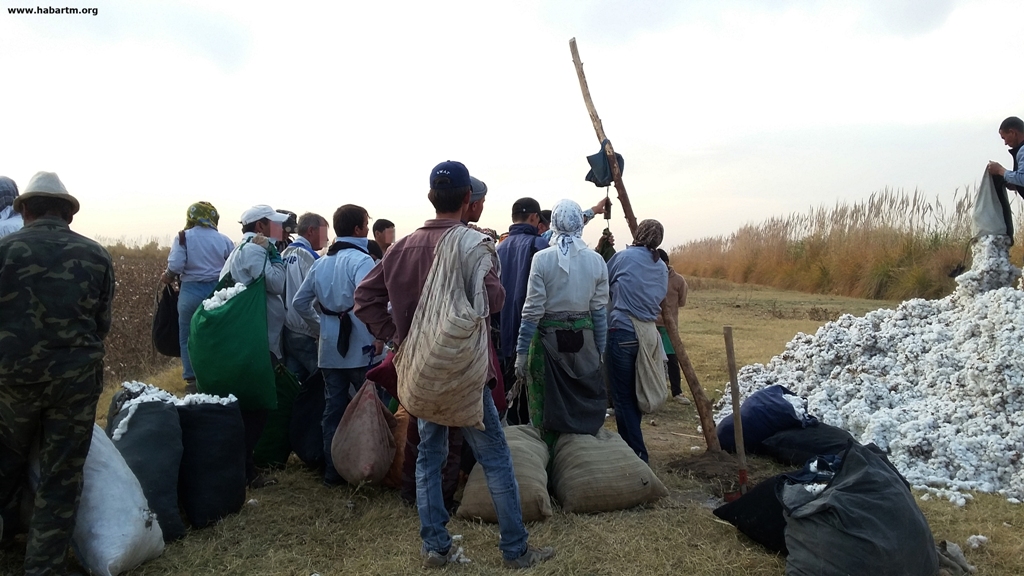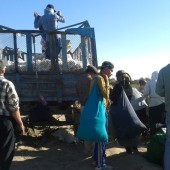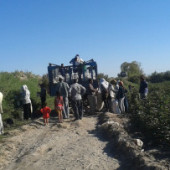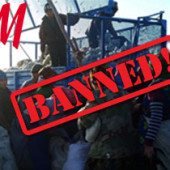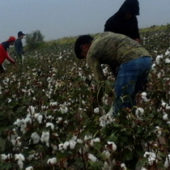The 2015 cotton harvest in Turkmenistan began in late August and did not end until well after the Turkmen government announced «a remarkable well-earned victory». The experience of the Turkmen people was the exact opposite. The government actually forced more citizens to pick cotton and intensified enforcement of harvest quotas in response to a late and low-yield harvest.
Alternative Turkmenistan News worked with a network of informants in all four cotton-growing provinces of Turkmenistan to document the central government’s orchestration of forced labor throughout the 2015 cotton harvest. In the previous field report, ATN reported that Turkmen officials forced public-sector workers from a wide range of institutions to pick cotton during an extraordinary long harvest season. In this report, we present information gathered during the last days of the harvest.
On November 16 the President of Turkmenistan Gurbanguly Berdymuhamedov ordered the country «to pick all cotton to the last boll.” The President holds the Deputy Prime Minister Esenmurat Orazgeldyev and the governors of the cotton growing provinces — Ahal, Dashoguz, Lebap and Mary – accountable for the cotton harvest. In response, regional governors instructed their deputies and heads of districts in their provinces to mobilize a specific number of cotton-pickers to the fields. The deputy governors, in turn, ordered administrators of the regional organizations under their supervision to mobilize their staff, including from the departments of education, health care, culture and sports and manufacturing, construction and transportation companies.
In each organization, the management appointed a person responsible for the cotton harvest. The designee organized and oversaw mobilization of staff to the cotton fields, tracked which staff picked cotton and which staff hired replacement workers, and monitored the workers’ progress towards their assigned harvest quotas. In schools, this designee was typically a vice-principal, in hospitals typically a deputy chief physician, and in companies typically a chairman of the trade union or a human-resources manager.
School official in Lebap forces teachers to buy cotton quota
Officials implemented the central government’s orders differently in the different provinces. The expectation of reaching the province’s quota, its portion of the national cotton production plan, influenced the approach.
In Lebap, officials ordered citizens to either pick cotton or pay the value of the harvest-quota assigned to them. For example, school administrators assigned teaching and maintenance staff quotas of 1,300 kilograms of cotton for the harvest and offered to accept fines from those unable to do the field work. Many teachers preferred to pay the fine rather than pick cotton. The teachers said that this practice of pick-or-pay has been the norm for a few years, but this year officials demanded a higher price for the cotton. A teacher from secondary school No. 6 in Magdanly, Lebap province, explained:
«Last year, we paid 0.70 tenge per kilogram, but this year, the cotton failed, and we had to pay 0.90 tenge per kilo. Based on the new rate, each of us must pay for 1170 manat ($334) worth of cotton. The principal is keeping a strict watch over the matter. He reminds us of the debt every single day, and threatens to withhold this amount from our salary. The closer it gets to the end of the cotton season, the more insistent are the demands to pay the cotton debt, to hand the money over. In Magdanly and other places, there have been cases when teachers or technical school staff refused to pay and quit their jobs.”
The target was reached, but the coercion continued to mid-December
On October 27, state-owned Turkmen TV reported that the country achieved the cotton harvest target. «Courageous farmers produced over 1 million 50 thousand tons of «white gold” for the Motherland’s granaries. Having honoured their commitments, cotton growers of the country continue to work at a fast pace to harvest all cotton to the last boll”, said the anchorman of the evening news program Watan. According to our sources, however, the coercive mobilization to pick this last boll began soon after the announced completion of the national plan and turned into a real survival test for the citizens forced to do the field work.
In Dashoguz region an employee of the regional housing and public utility service described the mobilization effort at the end of the harvest:
«Our boss spelled it out: he doesn’t need our work at the office, so those scheduled to go must head there tomorrow. There were about 30 of us. They put us in a bus and sent us to Ruhubelent [a remote district in the Dashoguz region]. It took us almost two hours to get there. It was cold. The crowd trudged reluctantly along the patches. There was nothing to pick, only bare stems. Closer to 5 pm, it turned out that together we had gathered only about 180 kilograms. It was too little. So the monitor of our group sent a hat around, and each of us put 1-2 manat in. He gave the money to the local farmer, and in return got a statement saying that we supposedly harvested 600 kilograms of cotton. The statement is a plain handwritten paper signed by the farmer and the head of the local farmers association. We submitted this paper to the administration.»
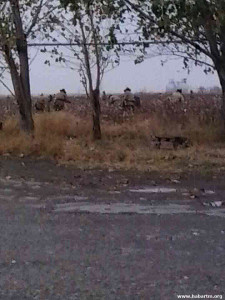 For the Turkmen government picking cotton is the duty of every good citizen
For the Turkmen government picking cotton is the duty of every good citizen
The Turkmen government treated refusal to contribute to the cotton harvest as insubordination, incitement to sabotage, lack of patriotism, and even contempt of the homeland. Those who refused faced all kinds of administrative penalties, including: public censure, docked pay, and termination of employment. Officials, however, are careful to not record refusal to pick cotton as the cause for firing people. Instead, they cite downsizing, management optimization, failure to comply with labor regulations, negligence, poor performance at work, etc. These statements make it impossible for terminated workers to appeal to the prosecutor’s office or the court.
Throughout 2015, members of the military also reported required participation in the cotton harvest. Soldiers worked in the cotton fields of Dashoguz, Lebap and Mary provinces, as pictured here on the outskirts of the town of Mary.
No one bothered to lecture soldiers about «cotton being the wealth of our country». The order to participate was not negotiable, and there were no reports of soldiers refusing to participate in the cotton harvest. In Lebap and Dashoguz regions, some soldiers got sick due to the lack of clean drinking water while working in the cotton fields.
The mobilization included bus and minibus drivers as well. From September through the end of November, officials ordered bus and other transportation companies to dedicate their services to transportation of people to the cotton fields. With vehicles taken off their routes, thousands of people were forced to use private cabs for their daily commute. These photos were taken in the Lebap region. Green license plates mean that these are city buses.
Completion of the national cotton production plan spawns doubts
As expected, on October 27, the 24th anniversary of Turkmenistan independence, President Berdymuhamedov received a report from the governors of the four cotton-growing provinces claiming successful completion of their cotton production targets. The milestone of 1 million 50 thousand tons of «white gold» was achieved, said the Deputy Prime Minister E. Orazgeldyev. State TV channels showed the top officials reporting to the President about the successful harvest, which, according to them, was only achieved thanks to the president’s fatherly care. The governors and the deputy prime minister did not say a word about those forced to pick cotton until their hands were sore and cracked. Instead, the State News Agency of Turkmenistan praised the president’s efforts:
«Great attention, which the leader of our nation gives to the agro-industrial complex, and the comprehensive government support of agriculture created the conditions for productive work. Providing farmers with fertilizers and quality seeds at reduced prices, giving them modern equipment — these and other measures opened up great opportunities for higher performance in the agricultural industry.»
However, sources at the state-owned enterprise responsible for the cotton industry, Turkmenpagta («Turkmen Cotton»), reported the claim of completion was a sham. Turkmenpagta staff said a significant portion of the declared harvest was only on paper; in other words, the figures were falsified. They said the falsified amount would become clear after processing the harvested cotton at the gins. They added that they observed more falsified reports of cotton harvested this year than last year, and estimated the missing cotton could amount up to 330,000 tons countrywide.
At a government meeting on November 6, the Turkmen Attorney General Amanmurad Hallyev officially confirmed the experts’ speculations regarding falsified harvest reports, calling them «outrageous». According to an attendee at the meeting, the attorney general cited complicity of the governors of Sayat and additional districts in Lebap province. The President on that meeting also reprimanded the Chairman of the State Committee on Statistics A. Mamedov.
A spokesperson for Turkmenpagta reported that falsified harvest reports came from additional provinces as well, including many parts of Dashoguz (Ruhubelent, Gurbansoltan Eje, Akdepe and Koneurgench districts) and Mary (Altyn Sahra, Vekilbazar and Mary districts).
A reporter from the Turkmen national TV noted that the false claims of the completed harvest could have been predicted:
«Everyone who works in print and electronic media in Turkmenistan is obligated to report if a “labor victory” has been achieved somewhere at the level of a farmers association or a region. When the year is good, central and regional newspapers are released with a header on the front page, announcing in large letters that a certain amount of cotton has been harvested. Over the entire 2015, the local media released only two reports of the work achievements by the cotton growers. On October 14, the newspaper «Neutral Turkmenistan» reported completion of the cotton harvesting plan by the farmers in Geokdepe district of the Ahal region, and on 23 October, of a labor victory achieved by the farmers association Turkmenistan in the Gubadag district of the Dashoguz province. Had there been other victories, our journalists wouldn’t have missed the opportunity to use them to praise the Turkmen President.”
2015 was a harsh cotton harvest for the Turkmen people
According to ATN’s network of informants, the Turkmen government continued systematic forced labor of tens of thousands of citizens to pick cotton in 2015 and may have forced more people to the harvest than in previous years. The Turkmen government’s response to a delayed and long cotton harvest was to pressure local officials to mobilize more people to the cotton fields. As a result, the 2015 cotton harvest was particularly strenuous for the Turkmen citizens forced to pick cotton. Local officials and administrators enforced harvest quotas rigorously, demanding the cotton picked or payment for it, and forced thousands to continue working in the fields in the cold as late as the second half of December.
Using forced labor in 2015, Turkmenistan continued to violate its international obligations under the conventions of the International Labor Organisation (ILO) concerning the abolition of forced labor. In addition, the authorities represented by the heads of ministries and state government agencies, heads of districts and regions, violated the Labor Code, Article 8 of which defines forced or compulsory labor as «any work (service), which is required of any persons under a threat of a penalty, and for which such persons have not offered their services voluntarily».
In 2015, there were no signs of the government considering any of these fundamental steps.
Similar to previous years, the 2015 cotton harvest took a heavy toll on the country’s economy. In fact, from the end of August to the end of December we witnessed near stagnation of the key national industries and the social sector. The government sent thousands of people from their workplace to the cotton fields in every province during the four-month harvest This meant they were not teaching children, treating patients, building homes, driving city buses, serving customers, etc. Staff of the Ministry of Economic Development reported to ATN that the cotton harvest strained the already troubled economy.
Significant corruption also characterized the 2015 cotton harvest. Officials sold exemptions from cotton picking, and there was no oversight over the payments. Many people paid farmers and farmers associations for statements that they completed harvest quotas. The amount of money circulated is difficult to estimate, and there was no transparency or oversight. However, the ATN received more reports of unaccountable payments in 2015 than in 2014.
In last year’s monitoring reports, ATN issued recommendations to the Government of Turkmenistan, and these recommendations are still relevant today. The Turkmen government should:
- Enforce national laws that prohibit forced labor, including by:
— instructing officials at all levels of government to refrain from using coercion to mobilize citizens to work in the cotton fields and
— prosecuting any officials that do; - Permit citizens to report human rights concerns about the use of forced labor without fear of retaliation;
- Invite the International Labor Organization to monitor forced labor during the 2016 cotton harvest with unfettered access and the participation of the International Trade Union Confederation and International Organisation of Employers;
- Reform the cotton sector, including by:
— ending mandatory cotton production and harvest quotas while ceasing in the meantime to penalize farmers and citizens who do not fulfill assigned quotas,
— ensuring financial transparency of cotton expenditures and revenues, and
— raising and eventually freeing cotton procurement prices.